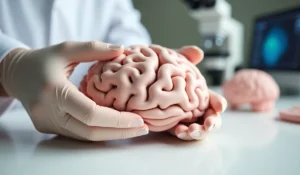Perimenopause is a natural transition leading up to menopause, marked by hormonal fluctuations and various physical and emotional changes. For some women, this phase can begin at a younger age than expected, which may bring confusion and concern. I’d like to explore what causes early onset perimenopause, its symptoms, the underlying chemistry, and how it impacts menopause later in life. We’ll also delve into how functional medicine can help manage perimenopause and offer tips to potentially prevent its early onset.
What Causes Perimenopause to Start at a Young Age?
Perimenopause typically begins in women between their late 30s and early 40s. However, several factors can cause it to start earlier. Genetics play a significant role; if your mother or sister experienced early perimenopause, you might be more likely to as well. Lifestyle choices such as smoking, excessive alcohol consumption, and poor nutrition can accelerate ovarian aging, leading to earlier hormonal changes. Certain medical conditions, including autoimmune disorders and thyroid dysfunction, can affect ovarian function and trigger early perimenopause. Surgical interventions like the removal of ovaries or uterus, as well as cancer treatments like chemotherapy and radiation, can also cause hormonal shifts that initiate perimenopause sooner than expected.
Understanding these factors is crucial in identifying and addressing early perimenopause. By recognizing the potential causes, you can take proactive steps to mitigate their impact.
Symptoms of Perimenopause
Perimenopause brings a range of symptoms due to hormonal fluctuations, particularly changes in estrogen and progesterone levels. You might notice irregular periods, with variations in menstrual cycle length, flow, and frequency. Hot flashes and night sweats are common, causing sudden feelings of warmth and excessive sweating. Mood swings can occur, leading to irritability, anxiety, or depression. Sleep disturbances might make it difficult to fall or stay asleep, affecting your energy levels during the day.
Other symptoms include vaginal dryness due to reduced estrogen levels, which can cause discomfort during intimacy. You may experience decreased fertility as ovulation becomes irregular, and changes in libido are also common, with fluctuations in sexual desire. Weight gain, especially around the abdomen, can occur as metabolism slows down. Cognitive changes like difficulty concentrating or memory lapses might affect your daily activities.
These symptoms vary in intensity and duration among individuals. It’s important to listen to your body and seek support if these changes impact your quality of life.
The Chemistry Behind Perimenopause
Perimenopause is characterized by hormonal shifts that affect the reproductive system. The primary hormones involved are estrogen and progesterone, produced by the ovaries, which regulate the menstrual cycle and influence various body systems. As the ovaries age, they produce less estrogen and progesterone, leading to hormonal imbalances. In response, the pituitary gland increases the production of follicle-stimulating hormone (FSH) and luteinizing hormone (LH) in an attempt to stimulate the ovaries. This hormonal tug-of-war causes the symptoms associated with perimenopause.
Additionally, fluctuations in neurotransmitters like serotonin and dopamine can contribute to mood changes and sleep disturbances. Estrogen influences the production and regulation of these neurotransmitters, so declining estrogen levels can affect emotional well-being.
Understanding the biochemical changes during perimenopause helps in developing strategies to manage symptoms and maintain hormonal balance.
Impact on Menopause Later in Life
Experiencing perimenopause at a younger age can influence the timing of menopause and have long-term health implications. Early perimenopause may lead to earlier onset of menopause, defined as the cessation of menstruation for 12 consecutive months. This can result in prolonged exposure to low estrogen levels, increasing the risk of osteoporosis due to decreased bone density. Estrogen has a protective effect on the cardiovascular system, so an early decline may raise the risk of heart disease. Extended hormonal fluctuations can also affect emotional well-being, potentially leading to long-term mood disorders.
Being aware of these impacts emphasizes the importance of addressing perimenopause proactively. Early intervention can help mitigate risks and promote better health outcomes later in life.
How Functional Medicine Can Help
Functional medicine offers a personalized approach to managing perimenopause by addressing the root causes and supporting the body’s natural balance. I focus on treating the whole person rather than just the symptoms.
A comprehensive assessment is the first step, involving a detailed medical history to evaluate family genetics, lifestyle factors, and environmental exposures. Hormonal testing measures levels of estrogen, progesterone, FSH, LH, thyroid hormones, and cortisol to identify imbalances. Nutritional analysis helps in identifying deficiencies or imbalances in vitamins and minerals essential for hormonal health. Lifestyle evaluation examines stress levels, sleep patterns, and exercise habits, which all play a role in hormonal regulation.
Based on this assessment, we develop a personalized treatment plan. Nutritional support is crucial; incorporating foods rich in phytoestrogens, such as flaxseeds and soy, can help balance hormones. Ensuring adequate intake of calcium and vitamin D supports bone health. Herbal supplements like black cohosh, red clover, and evening primrose oil may alleviate symptoms. It’s important to consult a professional before starting any supplements to ensure they’re appropriate for your situation.
Stress management techniques, including yoga, meditation, or deep-breathing exercises, help reduce cortisol levels and improve hormonal balance. An exercise regimen that includes cardiovascular activities, strength training, and flexibility exercises can boost mood, maintain weight, and strengthen bones. Sleep hygiene practices, like establishing a regular sleep schedule and creating a comfortable sleep environment, enhance sleep quality. Detoxification support involves reducing exposure to environmental toxins that may disrupt hormonal function, such as certain plastics and chemicals.
Functional medicine emphasizes collaboration between practitioner and individual. This partnership fosters empowerment and active participation in your health journey. By addressing the root causes and personalizing the approach, we can effectively manage perimenopause symptoms and improve overall well-being.
Tips to Prevent Early Onset Perimenopause
While some factors like genetics are beyond control, certain lifestyle choices may help delay the onset of perimenopause. Maintaining a balanced diet rich in fruits, vegetables, whole grains, lean proteins, and healthy fats supports hormonal health. Limiting processed foods, refined sugars, and excessive caffeine or alcohol can reduce stress on the body. Staying physically active through regular exercise helps regulate hormones and supports overall health.
Avoiding smoking is crucial, as smoking can accelerate ovarian aging. Managing stress through practices like mindfulness, meditation, or engaging in hobbies can balance hormones and support adrenal health. Regular health check-ups allow for monitoring of hormonal levels and early detection of any imbalances. Limiting exposure to environmental toxins by using natural personal care and cleaning products and reducing exposure to pesticides and industrial chemicals can also be beneficial.
Implementing these practices promotes hormonal health and may help delay the onset of perimenopause.
Embracing a Proactive Approach
Understanding perimenopause empowers you to navigate this transition with confidence. Recognizing symptoms early and seeking appropriate support can mitigate discomfort and maintain your quality of life. By addressing not just the symptoms but the underlying causes, functional medicine offers a holistic approach to managing perimenopause.
I believe in the power of personalized care and collaboration. Together, we can develop strategies tailored to your unique needs, helping you embrace this natural phase of life with grace and vitality.
Take the Next Step Towards Hormonal Balance
Experiencing perimenopause can be challenging, but you don’t have to face it alone. Support is available, and taking proactive steps can make a significant difference in your well-being.
Schedule a discovery call today. Contact Astra Health & Wellness at 435-565-1384. Let’s begin your journey towards hormonal balance and improved health.
References
- Mayo Clinic. (2022). Perimenopause: Symptoms & Causes. Retrieved from https://www.mayoclinic.org/diseases-conditions/perimenopause/symptoms-causes/syc-20354666
- North American Menopause Society. (2021). Understanding Perimenopause. Retrieved from https://www.menopause.org/for-women/sexual-health-menopause-online/causes-and-treatments/perimenopause
- Harvard Health Publishing. (2021). Navigating Perimenopause. Retrieved from https://www.health.harvard.edu/womens-health/navigating-perimenopause
- Cleveland Clinic. (2022). Perimenopause. Retrieved from https://my.clevelandclinic.org/health/diseases/15224-perimenopause
- Journal of Women’s Health. (2021). Lifestyle Factors Influencing the Onset of Perimenopause. Retrieved from [Link to Journal Article]
- World Health Organization. (2021). Hormonal Changes in Midlife Women. Retrieved from https://www.who.int/health-topics/menopause#tab=tab_1








